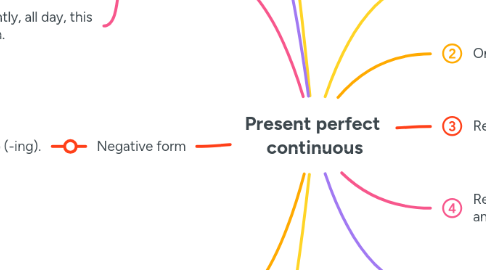
1. Affirmative form
1.1. Subject + have/has been + verb (-ing)
1.1.1. 1. I have been driving to the park 2. They have been dancing in the party. 3. My son has been learning English. 4. She's been studying about technology. 5. We have been playing soccer. 6.
2. Examples
2.1. 1. I have been reading for two hours.
2.2. 2. She has been working since morning.
3. Signal
3.1. For (duration): for two hours, for a long time.
3.2. Since (starting point): since last night, since January.
3.3. Lately, recently, all day, this week/month.
4. Negative form
4.1. Subject + haven’t/hasn’t + been + verb (-ing).
4.1.1. We haven’t been studying much lately.
4.1.1.1. 1. I haven't been drinking coffee this month 2. We haven't been practicing English these days. 3. He hasn't been working recently 4. You haven't been washing your car 5. They haven't been walking in the morning
4.1.2. He hasn’t been feeling well.
5. Interrogative form
5.1. Have/Has + subject + been + verb (-ing)?
5.1.1. Have you been waiting long?
5.1.1.1. 1. Have you been drinking coffee this morning? 2. have you been doing exercise these days? 3. Has she been cooking since last week? 4. Have you been swimming in the pool? 5. Has he been travelling this month?
5.1.2. Has she been cooking dinner?
6. Common Mistakes
6.1. Mixing it up with the present perfect simple
6.1.1. Present perfect simple focuses on the result: "I have read the book."(It's finished.)
6.1.2. Present perfect continuous focuses on the duration or ongoing nature: "I have been reading the book." (I'm still reading it or just finished recently.)
6.2. Using it with stative verbs
6.2.1. Incorrect: I have been knowing her for years.
6.2.2. Correct: I have known her for years.
